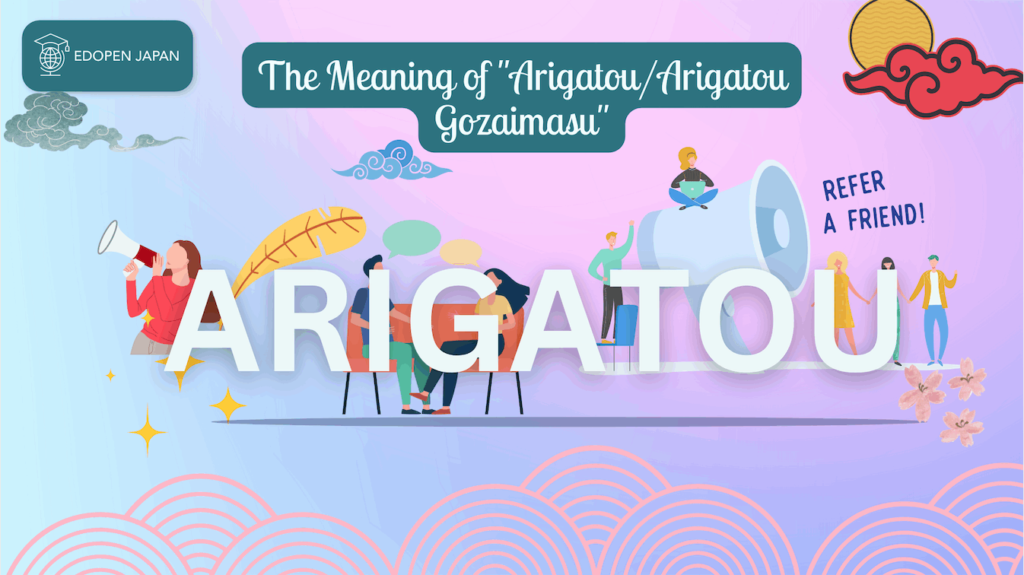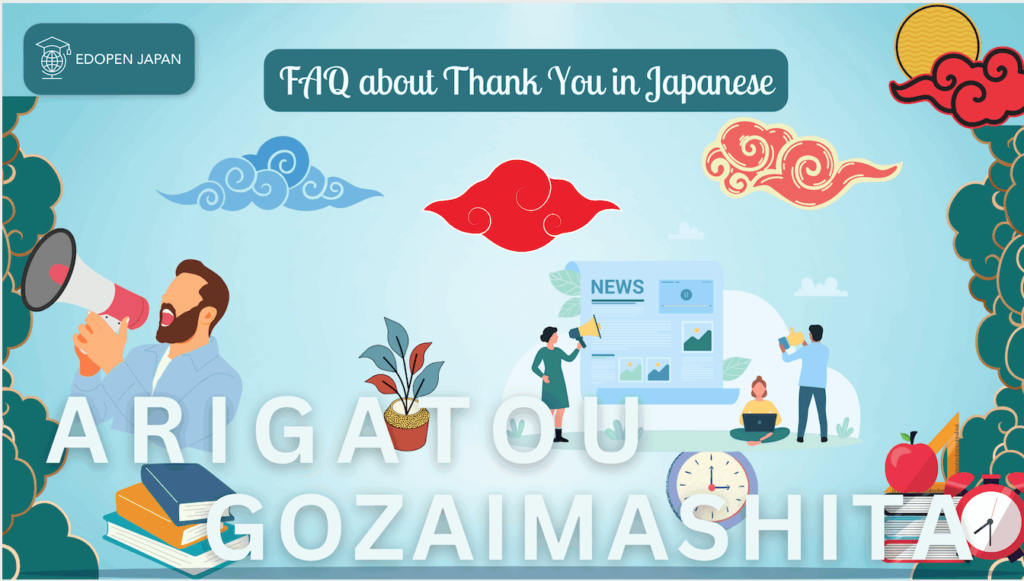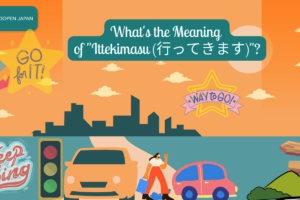Are you looking for a way to say thank you in Japanese? If so, please read this article. As you may have heard or seen in anime, etc., there are several ways to say “thank you” in Japanese.
In this article, you can learn different kinds of thank you expressions other than arigatou gozaimasu, which you can use depending on the situation, specific occasions and the level of the person you are talking to. The topic of saying thank you in Japanese is very appropriate for us to discuss and you need to know if you have the desire to live in Japan. Good for work, study or even moving there.
Why is this so important to understand? because this culture of gratitude is very inherent in Eastern countries, if we don’t fully understand the culture of gratitude, other people will behave less well towards us. Uniquely in Japanese, there are many expressions to express gratitude, each expression has a different meaning and different conditions of use.
Also, in Japanese dramas or films, you will often see scenes where Japanese people say “arigatou” or “arigatou gozaimasu” while bowing or just saying it with a grateful face. What is the actual meaning, how is it written, and what are the variations of this “arigatou”? let’s discuss this to the end, guys!
Contents
The Meaning of “Arigatou/Arigatou Gozaimasu”

Many people will be familiar with this Japanese phrase. Arigatou gozaimasu, which is used to say “thank you”, is usually used in general, mostly formal situations. It’s generally used when you want to say “thank you” to people you don’t know, who are much older than you or who have a higher social status than you.
It is said that etymologically Arigatou comes from Buddhism, from the word “お釈迦さま/Oshakasama/ Founder of Buddha”. This is an expression of joy and gratitude for the Buddha who was born as a human being.
It is said that etymologically Arigatou comes from Buddhism, from the word “お釈迦さま/Oshakasama/ Founder of Buddha”. This is an expression of joy and gratitude for the Buddha who was born as a human being.
In addition, if you would like to learn other phrases commonly used in everyday Japanese, such as how to say sorry in Japanese, please click on the link below:
Read also:
The Most Valuable Things to Know about “Wakaranai (分からない)”
What’s the Meaning of “Ittekimasu (行ってきます)”?
The Meaning of “Tadaima (ただいま)”
15 Great Ways to Express Thank You in Japanese

To deepen your understanding and broaden your knowledge, here are 15 ways to say thank you in Japanese.
1. Arigatou (ありがとう)
Arigatou is a more casual form of arigatou gozaimasu, which means ‘thank you’ in English. It is generally used when you want to casually say “thank you” to those closest to you, and this word is generally used in informal conditions, and is usually spoken to friends, family, or people of the same age.
Arigatou alone, without gozaimasu, cannot be used from the bottom up, but can be used from the bottom up, i.e. between employees and bosses, teachers and students, soldiers and commanders, and so on.
However, in this case we can still use it for parents, because in Japanese culture the family is our closest circle, so it’s okay to use casual language.
2. Arigatou Gozaimasu (ありがとうございます)
If you do not understand your current position and condition, this word is very safe and recommended to say. It means “thank you”. Arigatou gozaimasu is read as Arigatoo Gozaimas, the letter u is after the letter o in Japanese it is read as long as 2 beats, and on the word masu, desu, u is not read at the back.
The same applies to the end of sentences: ~ます/ ~masu or ~です/~desu has a more polite meaning than arigatou alone. It is used to express gratitude not only in everyday life, but also at work when communicating with bosses or clients. This phrase emphasises the expression of gratitude at that time.
For example, when you come to a seminar or event, you may hear the MC say / Honjitsu wa goraijo itadaki, arigatou gozaimasu/ Thank you for coming today. Even though there is a meaning to “come”, the MC wanted to emphasise their gratitude for being there and taking the time to listen to the seminar.
3. Arigatou gozaimashita (ありがとうございました)
Grammatically, this is the past form of arigatou gozaimasu. It has the same meaning and function as ありがとうございます /Arigatou Gozaimasu, the difference is in time. ありがとうございました/ Arigatou Gozaimashita is used to express gratitude for something that happened in the past (past tense).
ありがとうございました/ Arigatou Gozaimashita also has another meaning, namely that the relationship is only until then. If you want the relationship to continue, use ありがとうございます /Arigatou Gozaimasu.
Generally used to express gratitude to people who have bothered you or helped you in many ways, such as a shopkeeper who has helped and served you while you were shopping.
4. Doumo arigatou gozaimasu (どうもありがとうございます)
Standard expressions used in everyday life. This one expression is a sincere thank you. This thank you is often used for people who are highly respected, such as business clients, customers, directors, or people who are very important in our lives. It can be said that the level expression is much more polite and formal than arigatou or arigatou gozaimasu. The literal meaning is “thank you very much”.
5. Doumo (どうも)
Shorter than doumo arigatou gozaimasu, we can use the word doumo to say thank you. This short and concise expression is often used in informal situations between friends or relatives who already know each other.
6. Sankyu- (サンキュー) Thank You in Japanese Slang
This is an expression of ‘thank you’, derived from the English ‘thank you’. It is generally used in casual and non-formal situations and is more commonly used by young people. You can use this expression with friends of the same age, with friends you hang out with, or with friends you already know.
Interestingly, sometimes there are some people who convey in writing, in chat language young people often shorten the expression sankyu to 39. Numbers 3 for san and 9 for kyu. written with the number 39 because the way to read the number 39 is also “San Kyu”.
7. Sumimasen (すみません) Thank you and sorry for the trouble
There is something else that is unique to Japanese culture: the use of words that have different meanings in different situations.
The expression sumimasen is known as an expression of apology. In fact, this sumimasen is generally used to apologise, but under certain conditions this sumimasen can mean thank you, or it can also mean “I’m sorry to have bothered you”.
Therefore, sumimasen also means “thank you”. The meaning of “thank you” when we use this expression is that we are “apologising for being a nuisance and being grateful for what other people have done for us”. If it is our friend who is helping us, we can say sumanai or suman to replace the word sumimasen (which has a formal feel).
8. Otsukaresamadeshita (お疲れ様でした) Thank you for your cooperation or your work
Otsukaresama is an expression usually used when we finish a job. This expression is used to express gratitude for the efforts and hard work done by others, or to appreciate each other’s efforts and hard work done together. It simply means “thank you for your hard work”.
Otsukaresama is an essential greeting in Japanese work culture. The Japanese use it to thank their colleagues for their efforts.
9. Osewani narimashita (お世話になりました)
Similarly, otsukaresama deshita is a greeting often used in the business and professional world. Of course, it can also be used in other situations. The meaning is almost the same, used to express gratitude to others.
Osewani narimashita is generally used when you have received a lot of help, either for work or for other things. It can simply mean “thank you for your kindness”, “thank you for your service” or “thank you for everything”.
10. Makoto ni arigatou gozaimasu (誠にありがとうございます)
Putting the word “誠に/Makoto ni” before ありがとうございます has a deep polite and formal meaning. 誠に/Makoto ni means “really” or “very”. This phrase is often used in formal business emails, as well as a formal announcement in a department store or public facility.
11. Orei mōshi agemasu (御礼申し上げます)
Another expression of gratitude is 御礼申し上げます/Orei mōshiagemasu. 御礼/ Orei means thanks or gratitude and 申し上げます means to say, which is a very profound way of expressing ‘I would like to say’ in Japanese, which originally comes from the form 言う or iu, which means to say in Japanese.
Therefore, 御礼申し上げます/Orei mōshiagemasu can be translated as ‘I would like to express my deepest gratitude or thanks’.
12. Kansha itashimasu (感謝いたします)
This is a more direct way of expressing gratitude. いたす/itasu is a more polite and self-deprecating form than する/suru in Japanese, and can be used when sending business emails or to a boss.
And to express gratitude deeply and repeatedly, you can use phrase「重ねて感謝いたします」/Kasanete kansha itashimasu or 「改めて感謝いたします」/Aratamete kansha itashimasu. This phrase means “thank you very much” in Japanese.
13. Gochisousama deshita (ごちそう さま でした) – thank you for the meal
Slightly different from all the above expressions is the expression used to thank us for the food we have eaten, gochisou sama deshita. This expression is used to thank us for the food we have been given. This word is usually learned in pairs with the expression Itadakimasu (いただきます), which means happy eating.
It is also important to know this expression as it is commonly used in everyday Japanese life. This word means to thank all those involved in the production of food, from the farmer who planted it, to the farmer who tends the livestock, to the grocer who prepares the food, to everyone who has been involved in making the food we eat.
Gochisousama deshita or gochisousama for a more casual expression is used when we finish eating. It means “Thank you for this delicious food/dish”.
14. Go shinsetsu ni arigatou gozaimasu (ご親切にありがとうございます)
Although not everyone will be kind to you, there will be people who will be very kind to you, either by helping you from the bottom of their hearts or even by taking care of you. This kind person will probably be your boss, your friend or your superior.
Say this word to that person. This word will express your gratitude for that person’s kindness and concern. This phrase means ‘Thank you for being kind’ in Japanese.
15. Kochira Koso Arigatou Gozaimasu (こちら こそ ありがとう ございます)
Doitashimashite (どいたしまして) and Kochira (こちら こそ) Now that we have discussed all the ways to say thank you in Japanese, we need to know how to respond when someone says thank you.
For example, we want to reply “You are welcome” which is expressed in Japanese by the word “Doitashimashite” or we can just use the word “Kochira Koso” or we can just add this phrase before the word thank you, so it would be Kochira Koso Arigatou Gozaimasu (こちら こそ ありがとう ございます).
This will be very useful for you because there will be many people who will help you in your social life and it is easy to use this phrase which sounds very natural and beautiful in Japanese.
FAQ about Thank You in Japanese

Below are some questions about “how to say thank you in Japanese” that you may find confusing. Please read our answers and explanations.
If you still have questions about how to say thank you in Japanese or other expressions, please leave them in the comments section below!
Conclusion
Here are all the explanations and expressions for using arigatou or arigatou gozaimasu in Japanese. It can be summarized as follows:
- The expression arigatou gozaimasu is used when expressing gratitude in a more formal and polite way.
- For a more casual form of expression, we can use arigatou.
- In addition to arigatou or arigatou gozaimasu, there are 14 other expressions you can use to express gratitude or appreciation in Japanese. You can choose the one that best suits your situation.
Hopefully this article has been helpful and answered your curiosity, see you in the next article!












